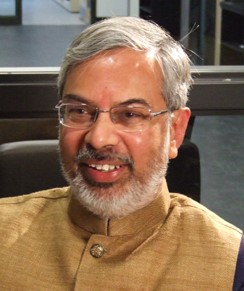
Kartikeya Sarabhai
Kartikeya V. Sarabhai is one of the world’s leading environmental educators, and a dedicated community builder – and also an astute and well-regarded industrialist.
Sarabhai is the founder and director of India’s Centre for Environment Education, headquartered in Ahmedabad. With 400 professional staff in 40 offices across the country, CEE reaches into every school system in India, in every Indian language and advising every state government on greening the curriculum. CEE is also active in Australia and Sri Lanka. In 2005, the organization received the Global Award for Outstanding Service to Environmental Education from the North American Association for Environmental Education (NAAEE).
Sarabhai was among the founders of the South and Southeast Asian Network for Environment Education, and he is currently the editor of the Journal of Education for Sustainable Development. He received the Tree of Learning Award from the IUCN in appreciation of his contributions to the field of environmental education and communication as well as the World Human Rights Promotion Award given by the Indian Institute of Human Rights.
In addition to his work in education, Kartikeya Sarabhai is a prominent member of such international environmental organizations as the Earth Charter International Council and the International Union for the Conservation of Nature. He attended the 1992 Earth Summit in Rio de Janeiro and the 2002 Earth Summit in Johannesburg as a member of the Indian delegations.
Kartikeya Sarabhai was born in 1947 to a prominent family in Ahmedabad. His grandfather was Ambalal Sarabhai, an industrialist who was closely associated with Mahatma Gandhi in the struggle for Indian independence. His mother was a dancer, and his father, Vikram Sarabhai, was a scientist, the founder of India’s nuclear energy program and also of its space program. Kartikeya set out to become a scientist himself, enrolling at Cambridge University to do a Tripos in Natural Science before being deflected by a growing interest in social issues.
After experiencing the Bihar famine of 1967 – an event which also radicalized Bunker Roy – Kartikeya turned his attention to social development, and enrolled in graduate studies in development communication at the Massachusetts Institute of Technology. He has said that it was his growing interest in the social environment that led him to his concern for the physical environment – and that both concerns merged in his work with CEE. The new organization was located, he remembers, “a barren hill” just outside Ahmedabad. When the CEE staff began growing trees on the exhausted land, Kartikeya “saw this wonderful environment just regenerate itself. So we started looking at the natural environment and then the link between the natural and the human environment,” struck by the interdependency between society and nature, by the realization that human development “takes place in the context of an environment.”
He has since set up several organizations that bridge the space between social and environmental development, including Viksat, an NGO working to strengthen citizen participation in natural resource management, and Sundarvan, a nature discovery centre. He is closely involved in the activities of the Nehru Foundation for Development and in Ahmedabad’s Vikram Sarabhai Community Science Centre. He is also the chairman of Ambalal Sarabhai Enterprises, the pharmaceutical company which was set up by his grandfather Ambalal Sarabhai, where he has proven himself an astute and innovative corporate leader.
Centre for Environment Education (CEE) in India, founded by Kartikeya was established in August 1984 as a Centre of Excellence supported by the Ministry of Environment and Forests. The organization works towards developing programs and materials to increase awareness about the environment and sustainable development. The head office is located in Ahmedabad.
CEE’s works are organized in ‘thrust areas’ such as: Education for children, Education for youth, Industry Initiatives, Sustainable Rural Development, Water & Sanitation, Bio-diversity Conservation, Eco-tourism, Training/Networking & Capacity building, Initiatives for the UN Decade of Education for Sustainable Development, etc.
Today, CEE works for a wide range of sectors, target groups and geographical areas. CEE sees a major opportunity in the UN Decade of Education for Sustainable Development (2005-14) to further contribute towards sustainable development. CEE offices in India: Ahmedabad (Main), South, North-east, North, Central, West, East, Delhi. CEE International Branches: CEE Sri Lanka, Bangladesh, Australia.
